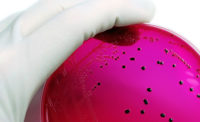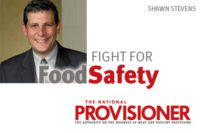 When it comes to the production of meat, the things industry can’t see are the things industry fears the most. Lurking somewhere in the darkest corner of a hotbox, on a carcass in the silent throes of a sales cooler, or in a case-ready package of beef patties being staged for delivery, there are a few colonies of pathogenic bacteria waiting patiently for their chance to wreak havoc in our business and lives.
When it comes to the production of meat, the things industry can’t see are the things industry fears the most. Lurking somewhere in the darkest corner of a hotbox, on a carcass in the silent throes of a sales cooler, or in a case-ready package of beef patties being staged for delivery, there are a few colonies of pathogenic bacteria waiting patiently for their chance to wreak havoc in our business and lives.
For more than a decade, our firm has worked closely helping the meat industry with crisis management, regulatory response and complex litigation following large-scale outbreaks and recalls. The unfortunate reality from a business perspective is that, in a disturbing number of instances, when outbreaks and recalls occur, the companies that are involved cease to exist.
Watching innumerable outbreaks unfold over the years, our firm has gained a deep understanding about the science of food safety, the epidemiology of foodborne illness outbreaks and the legal consequences of food-product recalls. We have also gained far-reaching experience analyzing why recalls occur in the first instance, and how they, in many instances, could have been avoided.
Although all companies want their customers to believe that their products are as safe as possible, and they try to communicate this fundamental message through their brand, in today’s world, success requires more than just a good advertising campaign. In order to sell food safely, a company needs to demonstrate it can process a safe product. In order to process a safe product, the company needs to invest in making it a reality. Food safety, unfortunately, doesn’t just “happen” by itself.
Thus, when working to protect the interests of my own clients, I usually start with a Brand Protection Audit. Usually, I can accomplish what I need in just a single day. I like to interview employees to learn more about the company’s real food-safety culture, and review food-safety training materials to suggest improvements. I also like to assess a company’s written food-safety plans, and look for hidden gaps that create additional exposure. Moreover, many companies are surprised to find out that their policies are not actually being executed as written.
In addition, companies easily can develop stronger and more effective supplier specifications, and indemnity agreements, that provide added protection, as well as ensuring that existing insurance coverage is sufficient to cover potential liabilities. We also work closely with companies to develop and then conduct mock recall training, in as close to a real-world scenario as possible, to test their ability to trace and also contain a potential problem.
Finally, we provide advice to our clients on to best respond to government-issued NRs (so as to avoid criticisms months or years later from a judge or jury), and also prepare for and respond to both routine and for cause Food Safety Assessments. Many companies simply do not realize that what they say today can (and always will) be used against them tomorrow.
With that said, merely creating the “image” that you care about food safety is no longer enough.
History has taught us that by taking a few additional proactive steps right now, such as auditing the true depth and survivability of your brand (i.e., the Brand Protection Audit), companies can significantly strengthen the trust in, and longevity of, their most important assets — their image and their brand.





Report Abusive Comment